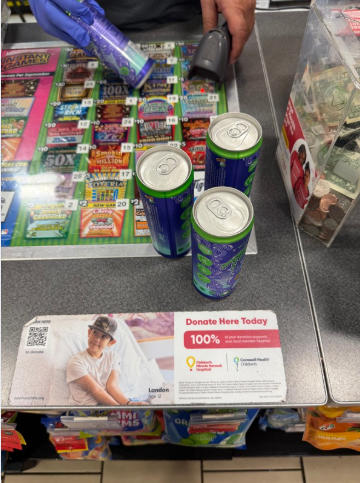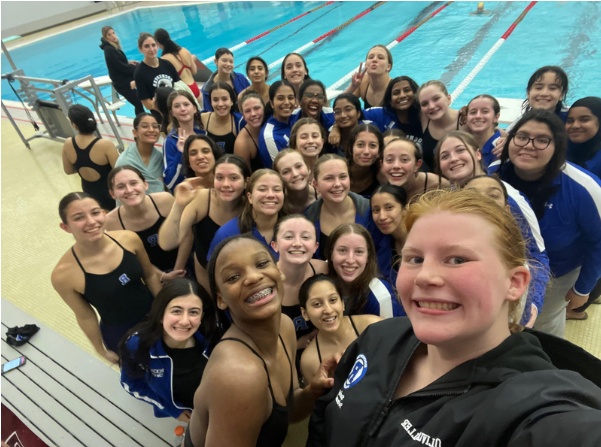Column: Anxiety
January 5, 2017
No one told me that calm was a luxury. But, then again, nobody expects you to know that clean water or internet access are luxuries either. A pair of shoes, working hands, winter coats. Freedom, acceptance, love; All luxuries. No one told me that calm was a luxury.
Lots of people like to ask what happens to you when your mental health starts to falter. A lot of the times, there’s an answer. I struggled to find one. My life, in reality, was great. I hadn’t found anything but confusion when I searched for an answer as to why I’d suddenly missed three days of school in a week–the other two days, I had gone home early. Fear is the root of anxiety, and I was terrified.
The difference between being anxious and having severe General Anxiety Disorder became as prominent as the contrast of black & white. No one should be expected to know this difference automatically–it’s difficult to contemplate even when it’s swallowing you. For the sake of understanding (which is what I hope to achieve in this piece), a therapist had told me something that I always inundate to anyone that cares to ask. Anxiety, in it’s simplest terms, is when the brain takes what people generally experience as nervousness (think the moments before a presentation, etc) and amplifies it by 50, 60, 100, etc, based on how severe the conditions is. In short, it’s laborious, demanding, and no walk in the park.
I won’t give anyone a useless cliche as to how I “wouldn’t change my experience for anything”. Given the choice, I’d give it away in a heartbeat. The romanticization of sadness and struggle is something that I will always persevere. I will never perceive or glorify myself as stronger, more noble, or better than the average person because of what I had been given. I am an average person.
A 7-month struggle with anxiety has taught me things. Things I’d do differently, things I’d look out for, things I’d maintain. I’d have saved myself in a multitude of ways if I knew how to handle those feelings of anxiety. Of course, no one should be expected to know how to deal with anxiety without help (how could they?). Therefore, I come to inform anyone who is lost through my experience. A flashlight is much more helpful in the dark.
My first course of action upon being faced with battling my own head was therapy. I still see the same one to this day. I won’t say that therapy fixed everything for me, but it was incredibly valuable. The most important part in mental health struggles is being able to escape yourself. This is something I wished I had known. A therapist is two things: A listener, and an interpreter. When you hear the running cliche that all therapists have to do is ask how something makes you feel, and their job is done, it’s more correct than I’d thought. Let it out. Let the rational side of your brain speak, even if just to a friend. Imagine being sealed up inside a jar alongside a rotting piece of fruit. The smell doesn’t stop suffocating you unless you open the jar.
I’m not going to come out and tell anyone that therapy can fix everything for everyone, because it’s not necessarily true. I’m one person, with one experience. At time, my anxiety got too tough to handle with only 45 minutes every Tuesday of talking about what went wrong through the week. Therapy, however, taught me things that I’d made sure to write down; things that separated the parts of me like an experienced surgeon would (of course, in the beginning, it was more like a college student performing for the first time on a dummy, but even that takes practice). While therapy didn’t cover all of the issues I had been dealing with, it still took some of the weight off, and I am incredibly thankful.
I won’t say that dealing with General Anxiety Disorder was impossible, because it wasn’t. In the end, it plainly left life unfocused- and I was exhausted of straining. I chose to medicate my unbalanced brain because it took the remaining weight off of my shoulders. In no way am I saying that this is the only route, or even the “correct” one, but it had worked beautifully for me. No human being is the same, but we all have one thing in common; a chance to get better. Furthermore, I leave you with this: do what you have to do. Whether it’s seeing a therapist, talking to someone you trust, doing yoga, or looking into medicine. Do not give up. It’s okay to hit the bottom, (it’s not the end of the world, I’ve done it plenty of times, and here I stay) because you’ll always find a way to get back up. More than anything, I plead for everyone struggling to be nice to themselves. Tell yourself it’s alright to make a mistake, and that the road to recovery is not exponential. This is one cliche that I beg you to listen to. Keep going to school, work, church, etc. The last thing you want is avoidance – avoidance harbors fear, and anxiety is fear. Though it’s not fun, exposure therapy is effective. Trust me. Remember, out of all, that you are valuable and loved. Last tip: go stargazing. It works.







